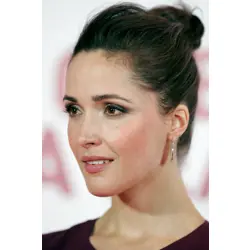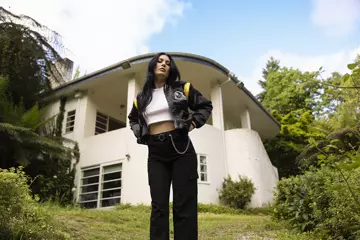 Rose Byrne
Rose Byrne“It's strange when people think of me, now, for comedy, because relatively speaking I've done way more drama. Saving the world! The end of the world! Zombies! Glenn Close!” laughs Rose Byrne. The Sydney-born actress is back in Australia, blowing through the country on a promotional tour, talking up I Give It A Year. A Working Title rom-com from Sacha Baron Cohen collaborator Dan Mazer, the flick turns the template upside-down: beginning with the wedding, and ending with divorce.
“It's a very clear, concise subversion of the genre; you're rooting for the main couple to break up, rather than stay together,” Byrne says. “My character is one of those people who are living their life to a schedule. And for her, the wedding is the defining event of that; it's this thing she's dreamt about her whole life, to the point where it almost feels more important to her than the marriage itself.”
Though best known for five seasons of the legal series Damages – where she starred opposite Close, and was nominated for both an Emmy and a Golden Globe – Byrne has recently been making a name for herself as a comedienne, which is something she doesn't take for granted. “Comedy is harder,” Byrne says. “It's still dramatic, but then you've gotta get a laugh on top of it.”
I Give It A Year stands in stark contrast to her next film, The Place Beyond The Pines, an “epic” Bradley Cooper/Ryan Gosling-starring saga that marks Derek Cianfrance's follow-up to Blue Valentine (“a slightly different film about a marriage falling apart,” Byrne laughs). “Derek Cianfrance has a really great way of working; the sets are very free, there's no marks, you can roam around freely,” Byrne offers.
Don't miss a beat with our FREE daily newsletter
Though it's a dark drama, Byrne sees the freedom of working on The Place Beyond The Pines as comparable to 2010's Get Him To The Greek, which marked her breakout comic performance. “It was really fun and really liberating,” she recalls, of a role as a chav-ish British pop star. “[My character] was really wild, and self-absorbed, and had no filter; I was basically being asked to be the female version of Russell Brand.”
It marked Byrne's indoctrination into the film 'family' of Hollywood comedy mogul Judd Apatow, and led to her being cast in the instantly-iconic 2011 comedy Bridesmaids. “I love the fact that Bridesmaids examined a woman in her late-30s who was at a crossroads in her life. Like: financially unstable, living with her mother, had bad experiences with guys, hadn't got her shit together,” Bryne says. “That's really rare in a Hollywood film to see that; there's this implied message that it's okay to be like that in your late-20s, but never in your late-30s. Similarly, female friendship is a theme we certainly don't see enough of, in film or in TV.”
Though long aware of Hollywood's gender imbalance, Byrne was, still, somehow “totally unprepared” for how much Bridesmaids was going to table that discussion. “The line is always that it's a business, that we have to sell tickets to males aged between 15 and 30,” Bryne, now well practiced, surmises. “But then there'll be something that comes along – like Bridesmaids, or like Girls – that becomes a huge success, and it's this reminder of the fact that, hey, women are consumers too. But, for whatever reason, unfortunately, they're the consumers that just aren't as catered to.”
In cinemas Thursday 28 February.















